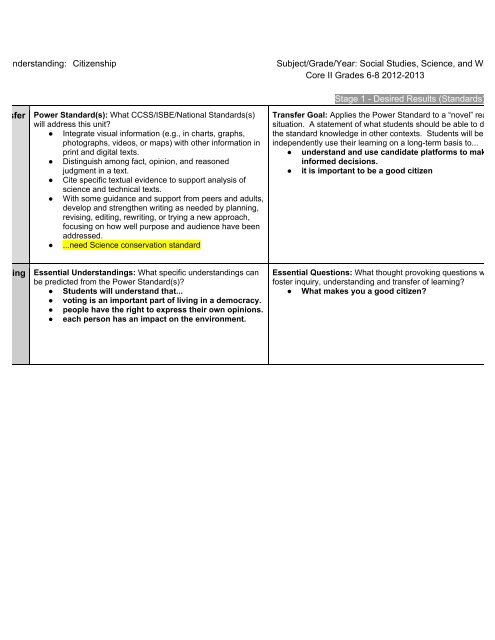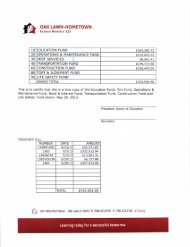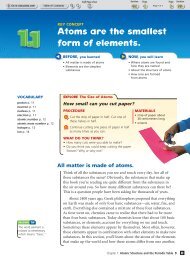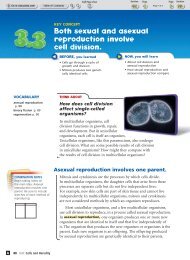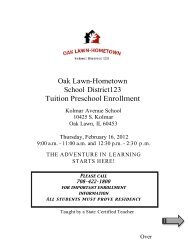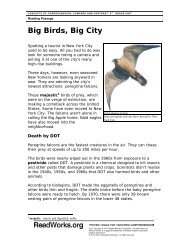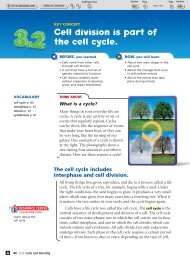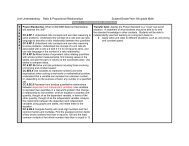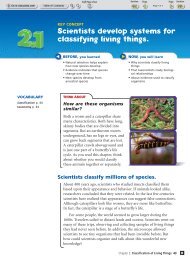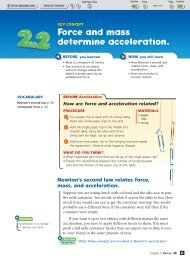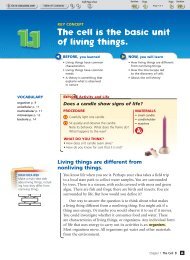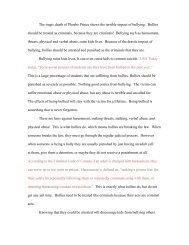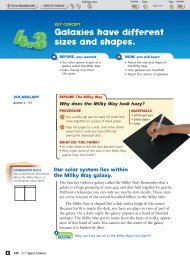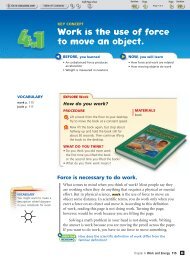Citizenship UBD
Citizenship UBD
Citizenship UBD
Create successful ePaper yourself
Turn your PDF publications into a flip-book with our unique Google optimized e-Paper software.
t Understanding: <strong>Citizenship</strong><br />
Subject/Grade/Year: Social Studies, Science, and Writin<br />
Core II Grades 6-8 2012-2013<br />
Stage 1 - Desired Results (Standards)<br />
nsfer Power Standard(s): What CCSS/ISBE/National Standards(s)<br />
will address this unit?<br />
● Integrate visual information (e.g., in charts, graphs,<br />
photographs, videos, or maps) with other information in<br />
print and digital texts.<br />
● Distinguish among fact, opinion, and reasoned<br />
judgment in a text.<br />
● Cite specific textual evidence to support analysis of<br />
science and technical texts.<br />
● With some guidance and support from peers and adults,<br />
develop and strengthen writing as needed by planning,<br />
revising, editing, rewriting, or trying a new approach,<br />
focusing on how well purpose and audience have been<br />
addressed.<br />
● ...need Science conservation standard<br />
Transfer Goal: Applies the Power Standard to a “novel” real w<br />
situation. A statement of what students should be able to do w<br />
the standard knowledge in other contexts. Students will be abl<br />
independently use their learning on a long-term basis to...<br />
● understand and use candidate platforms to make<br />
informed decisions.<br />
● it is important to be a good citizen<br />
aning Essential Understandings: What specific understandings can<br />
be predicted from the Power Standard(s)?<br />
● Students will understand that...<br />
● voting is an important part of living in a democracy.<br />
● people have the right to express their own opinions.<br />
● each person has an impact on the environment.<br />
Essential Questions: What thought provoking questions woul<br />
foster inquiry, understanding and transfer of learning?<br />
● What makes you a good citizen?
quisi<br />
t<br />
on<br />
Knowledge: What should students know as a result of this<br />
unit? What can be studied? (Theory/Concepts/Mental<br />
Coordination)<br />
Students will know...<br />
● researching a political platform<br />
● how to write and support an opinion<br />
● classification of recycling process<br />
● results of natural disasters<br />
● environmental impact<br />
● importance of voting<br />
●<br />
Skills: What should students be able to do as a result of this unit?<br />
What can be practiced? (Application of Theory/Concepts/Physical<br />
Coordination)<br />
Students will be able to...<br />
● debate<br />
● components of research<br />
● word processing<br />
● campaign speeches<br />
Stage 2 - Evidence<br />
mative Performance Assessment(s): Is each standard and transfer goal being assessed? An authentic assessment(s) designed to sho<br />
students demonstrate their understanding of essential questions and transfer goals when applied to a new, varied, or realistic situation.<br />
uld be written in the GRASPS format and reflect the UbD “Six Facets of Understanding”.<br />
● Political Campaign Speech<br />
○ chart<br />
○ speech contains facts and opinions of issues including a conservation issue<br />
○ speech has several drafts from peers and teachers
essment Criteria: What criteria will be used in each assessment to evaluate attainment of each desired result? What are the qualities by<br />
ch learning is judged? Think rubric components!!! (Content, Process, Product, knowledge, skill)<br />
structively aligned assessment criteria begin with a noun that complements the verb in the assessment tasks objective. If the objective is f<br />
dents to "explain how concepts in the subject interrelate" one of the criteria might be "Clarity of explanation". That is, the criterion describes<br />
lity in the assessment task that will be judged as an assessment. Other commonly used quality words used in criteria include: Accuracy,<br />
rency, Depth, Impact, Legibility, Originality, Succinctness, and Relevance.<br />
●<br />
mative Assessment Evidence: What daily evidence has been collected to determine goal attainment? Tests, quizzes, discussions,<br />
ework, exit slips, graphic organizers, note-taking, etc…<br />
● ·<br />
Stage 3 - Learning Plan (Activity)
-Assessment: What will be done to determine students’ background knowledge, skill level, and possible misconceptions? (K-W-L) How w<br />
dents be grouped? What opportunities for differentiation will take place?<br />
ned Learning Activities: What will be done each day to foster student success at transfer, meaning, and acquisition? How will critical<br />
king, problem solving, and systems thinking be incorporated? Consider the “Gradual Release of Responsibility Model” and “WHERETO”<br />
at when developing daily experiences linked to Stages 1 and 2.
e(s) “We Will…”<br />
Objective:<br />
How are action verbs<br />
used to link content to<br />
the Power Standard<br />
for each learning<br />
experience?<br />
Procedures:<br />
What is the daily lesson plan process? What is the step-by-step path of learning?<br />
How are learning activities prioritized and sequenced in an engaging and time<br />
sensitive manner? How are learning experiences differentiated or modified to meet<br />
assessed learning needs? How are the daily products connected to Summative<br />
Performance Tasks?<br />
Progress Monitorin<br />
How is progress tow<br />
transfer, meaning, a<br />
acquisition regularly<br />
monitored?<br />
What are the<br />
misunderstandings?<br />
How will students<br />
receive relevant<br />
feedback?<br />
ek1<br />
We will introduced<br />
and explore the<br />
concepts of debate,<br />
fact/opinion, reusing,<br />
saving/wasting water<br />
and recycling.<br />
SS<br />
● Students will take a pre assessment on debate listing everything they<br />
know on the subject.<br />
● During this week students will complete a variety of activities learning<br />
about and preparing a debate as an entire group.<br />
● By the end of the week students should be able to state the meaning<br />
of the word debate.<br />
●<br />
Writing<br />
● Students will be introduced fact and opinion (What is a fact/opinion?)<br />
● Students will be able to identify a fact and opinion<br />
Science<br />
●<br />
During the first week, students will take a pre assessment indicating the<br />
amount of knowledge they have regarding what environmental issues are.<br />
●<br />
●<br />
●<br />
●<br />
Students will be engaged in activities learning about recycling, reusing, and<br />
reducing in the environment and the effects of global warming in the world.<br />
resource:<br />
http://www.sciencekids.co.nz/gamesactivities/recycling.html<br />
Students will view a variety of brief videos showing some of the effects of<br />
global warming over time.<br />
resource: http://video.nationalgeographic.com/video/environment/globalwarming-environment/global-warming-101/<br />
Students will take a post assessment indicating what they now know about
environmental issues.<br />
Resources:<br />
http://homeworktips.about.com/od/essaywriting/a/100-Persuasive-Essay-Topics.htm<br />
http://www.ereadingworksheets.com/writing/persuasive-essay-topics/<br />
ek 2<br />
Science<br />
● Students will review the 3 R’s ; reuse, recycle, reduce as well as global<br />
warming and its effects on our planet and living things.<br />
● What is a debate? Students will discuss, using background knowledge from<br />
Social Studies class what is a debate?<br />
● Develop teams to debate environmental issues and their importance to<br />
individuals.<br />
Social Studies:<br />
● Based upon on the gradual release model, students will work in groups to<br />
plan both sides debating the question “Should we continue to celebrate<br />
9/11?”<br />
● Before students begin actually debate on this topic, they will view a video of<br />
a 6 th grade class completing a debate.<br />
Writing<br />
●<br />
Introduce persuasive writing
ek 3<br />
ek 4
ek 5<br />
ek 6


